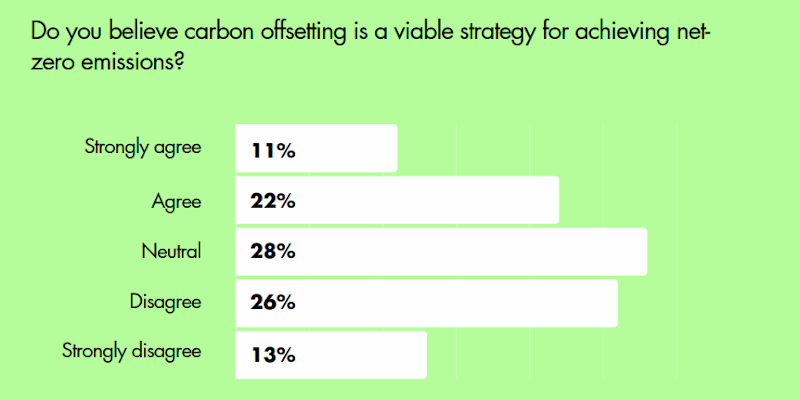80% of environmental professionals in the UK have concerns about the credibility and transparency of carbon offsetting schemes
According to the National Environmental Services Survey.
The Environmental Services and Solutions Expo is the UK’s largest environmental conference. It will take place in the National Exhibition Centre in Birmingham in September 2024. Each year, the Expo carries out a National Environmental Services Survey.
Almost 1,500 professionals from the UK environmental services industry responded to the Survey.
Carbon offsetting was one of the topics in the Survey.
80% of environmental professionals stated that they are concerned about the credibility and transparency of carbon offsetting schemes.
Rob Mowat, Managing Director of Environmental Services and Solutions Expo, commented that,
“It is alarming to hear that so many sustainability experts believe carbon offsetting schemes are actually failing the environment.
“While there are some businesses entering into highly certified programmes, there are concerns from many across the industry that these schemes are simply another form of greenwashing and can, in some instances, cause more harm to the environment than good.”
Mowat is sitting on the fence here. The reality is that all offsets cause more harm to the environment than good. As Kevin Anderson has pointed out repeatedly, offsets are actually worse than doing nothing.
Here’s how The Guardian explains Anderson’s position on carbon offsetting:
Kevin Anderson, professor of energy and climate change at the University of Manchester, says that offsets are actively dangerous. “My take on offsets, even supposedly good ones, is that from a climate perspective they are worse than doing nothing.”
This is partly owing to the “rebound” effect, he says. Essentially, if people think their carbon-emitting activities are covered by offsetting, they have no incentive to really reduce their emissions, and this encourages the continuation and even expansion of high-carbon activities.
Think of flying — if you believe that your flights are carbon-neutral, you will continue to take more of them.
Another issue is the time lag between the emissions and the impact of the offset. Each flight you take is pouring carbon dioxide into the atmosphere, where it will continue to heat the planet, even though the trees you consider to be offsetting your journey are taking up to a century to grow.
For Anderson, there are also equity issues – offsets are often used to cover for high-carbon activities in richer nations, without really benefiting the poor countries they are often bought from.
Anderson says: “The timeframe for cutting CO₂ associated with “pursuing . . . 1.5°C” and “well below 2°C” [the requirements of the Paris agreement] is now so tight that there is no emissions space for companies to use offsetting as a means of further locking in high-carbon activities, technologies, norms and practices, even under the heroic assumption that offsetting actually works. Put simply, we need to pull every mitigation lever to its max level; there is no longer any give or flexibility in the system.”
He adds: “Trees, and temporary CO₂ sequestration, are not an offset for an essentially permanent transfer of carbon from the lithosphere into the atmosphere.”
94% of the respondents to the National Environmental Services Survey stated that they believe that greenwashing is prevalent.
Here are the parts of the Survey relevant to carbon offsetting and greenwashing:












Forgive me, I should’ve asked a less than rhetorical question.
As if the perpetrators of the greatest moral crime in history are going to correct it?
As well they should. The only legitimate method is direct sequestration from the atmosphere forming the carbon into a valuable solid. Self incentivized. The dynamic already exists. Over a dozen companies are doing such for between six and $1200 per ton. With quality carbon fiber retailing at $32,000 per ton, I can only surmise the people with the capital to do so simply are not interested in the survival of complex lifeforms on earth.